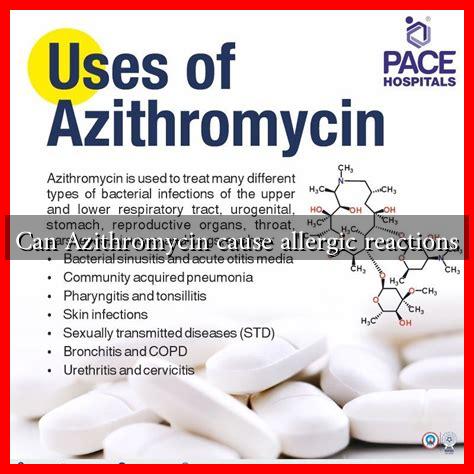-
Table of Contents
Can Azithromycin Cause Allergic Reactions?
Azithromycin is a widely used antibiotic that belongs to the macrolide class of medications. It is commonly prescribed to treat various bacterial infections, including respiratory infections, skin infections, and sexually transmitted diseases. While azithromycin is generally considered safe and effective, some individuals may experience allergic reactions to this medication. This article explores the potential for allergic reactions to azithromycin, the symptoms to watch for, and what to do if you suspect an allergy.
Understanding Allergic Reactions
An allergic reaction occurs when the immune system mistakenly identifies a substance (allergen) as harmful and mounts a defense against it. This can lead to a range of symptoms, from mild to severe. Allergic reactions can be triggered by various substances, including medications like azithromycin.
Prevalence of Allergic Reactions to Azithromycin
While allergic reactions to azithromycin are relatively rare, they can occur. According to a study published in the *Journal of Allergy and Clinical Immunology*, the incidence of drug allergies in the general population is estimated to be around 10%. Among these, antibiotics are the most common culprits, with macrolides like azithromycin accounting for a significant portion of cases.
Symptoms of Azithromycin Allergies
Allergic reactions to azithromycin can manifest in various ways. Common symptoms include:
- Skin Reactions: Hives, rash, or itching.
- Respiratory Issues: Difficulty breathing, wheezing, or throat swelling.
- Gastrointestinal Symptoms: Nausea, vomiting, or diarrhea.
- Anaphylaxis: A severe, life-threatening reaction that requires immediate medical attention.
It is crucial to recognize these symptoms early, as some reactions can escalate quickly. Anaphylaxis, for instance, can occur within minutes of exposure and requires emergency treatment.
Case Studies and Examples
Several case studies highlight the potential for allergic reactions to azithromycin. For instance, a 2018 report in the *American Journal of Medicine* documented a case of a 32-year-old woman who developed anaphylaxis after taking azithromycin for a respiratory infection. The patient experienced difficulty breathing and swelling of the face and throat, necessitating immediate intervention with epinephrine.
Another study published in *Allergy* reported a case of a 45-year-old man who developed a severe skin rash after taking azithromycin. The rash was accompanied by fever and joint pain, leading to a diagnosis of drug-induced hypersensitivity syndrome.
Risk Factors for Allergic Reactions
Certain individuals may be at a higher risk of developing allergic reactions to azithromycin. These risk factors include:
- History of allergies to other medications, particularly antibiotics.
- Previous allergic reactions to azithromycin or similar drugs.
- Genetic predisposition to drug allergies.
- Co-existing medical conditions, such as asthma or eczema.
What to Do If You Suspect an Allergy
If you suspect that you are experiencing an allergic reaction to azithromycin, it is essential to take the following steps:
- Stop Taking the Medication: Discontinue use immediately.
- Seek Medical Attention: Contact your healthcare provider or go to the nearest emergency room, especially if you experience severe symptoms.
- Inform Your Doctor: Provide your healthcare provider with a detailed history of your symptoms and any other medications you are taking.
Conclusion
While azithromycin is an effective antibiotic for treating various infections, it is essential to be aware of the potential for allergic reactions. Symptoms can range from mild skin reactions to severe anaphylaxis, and recognizing these symptoms early can be life-saving. If you have a history of drug allergies or experience any adverse reactions while taking azithromycin, consult your healthcare provider immediately. For more information on drug allergies and their management, you can visit the Australian Society of Clinical Immunology and Allergy.
In summary, while allergic reactions to azithromycin are not common, they can occur. Understanding the symptoms, risk factors, and appropriate responses can help ensure your safety and well-being when using this medication.

